As part of this week’s discussion on “Mature Masculinity,” I thought I’d take a closer look at films and television shows that depict men grappling with questions of identity and what it means to be a man in the modern world. As we’ve discussed this week, those questions don’t have easy answers and so I decided not to look for idealized depictions of modern masculinity (hello Atticus), but films where I see questions of identity being asked and the roles men perform considered from different angles — these are fathers, partners and friends trying to figure out where they fit in the world. As always, feel free to add to my list (or disagree) — given in no particular order below.
;
The Big Lebowski
The Dude’s world is filled with dinosaurs of masculinity — from loan shark pornographer Jackie Treehorne to Walter, an impotent Vietnam Vet filled with rage, or The Big Lebowski himself, a corrupt and crippled capitalist. Tellingly, the men in the film are not engaged with the modern world or with the women around them — to the few female characters in the movie, the men have limited uses as sperm donors, dog sitters or meal tickets. In one of the film’s best scenes the Cohen brothers slyly ask questions about male identity. Backed by Mozart’s Requiem, the Big Lebowski asks, “What makes a man, Mr. Lebowski? … Is it being prepared to do the right thing, whatever the cost? Isn’t that what makes a man?” And The Dude quips, “Hmmm… Sure, that and a pair of testicles.”
;
;
Fight Club
David Fincher’s 1999 film depicts a man literally fractured by the modern world. The nameless narrator is numb and finds himself disillusioned with the fruits of a safe materialistic world, the culmination of years of bloody struggles, imperialism and the triumph of traditional Western values. Embracing revolution and violence through Tyler Durden, the narrator wants to tear his identity and the safe world apart, but the movie leaves the audience questioning whether violence is the answer.
;
;
;
;
;
Say Anything
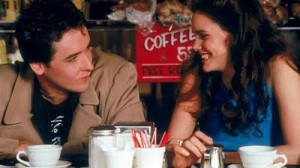 Every smart girl’s high school crush, Lloyd Dobler, makes this list, not for his sensitivity or boom-box holding, but for his ability to talk to and truly enjoy the company of women and his willingness to take a backseat to the ambitions of his beloved.
Every smart girl’s high school crush, Lloyd Dobler, makes this list, not for his sensitivity or boom-box holding, but for his ability to talk to and truly enjoy the company of women and his willingness to take a backseat to the ambitions of his beloved.
;
;
;
;
Mad Men
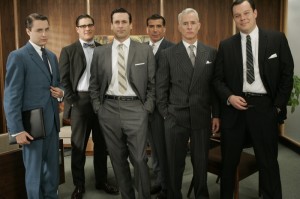 Mad Men’s nuanced portrayal of sexism and patriarchal culture in the 1960s (and, by extension, today) brilliantly shows how those forces shape our concepts of gender, identity and values. The outright glamour and beauty of the show (and the fetishizing of 1960s dress and decorating it has inspired) sometimes threatens to undo its lofty ambitions. Still, few shows boast more female characters with complex inner lives or a leading man who is so tied up in the questions of what it means to be a man as the world around you rapidly changes.
Mad Men’s nuanced portrayal of sexism and patriarchal culture in the 1960s (and, by extension, today) brilliantly shows how those forces shape our concepts of gender, identity and values. The outright glamour and beauty of the show (and the fetishizing of 1960s dress and decorating it has inspired) sometimes threatens to undo its lofty ambitions. Still, few shows boast more female characters with complex inner lives or a leading man who is so tied up in the questions of what it means to be a man as the world around you rapidly changes.
;
;
;
Sopranos
 Who better represents the conflicts of modern masculinity than the often savage, misogynistic and deeply conflicted Tony Soprano? In the framework provided by the patriarchal gangster world, the show brilliantly dissects violence, fidelity and identity.
Who better represents the conflicts of modern masculinity than the often savage, misogynistic and deeply conflicted Tony Soprano? In the framework provided by the patriarchal gangster world, the show brilliantly dissects violence, fidelity and identity.
;
;
;
;
;
In Good Company
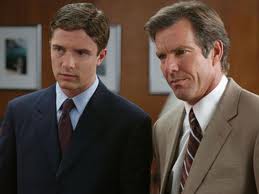 This small 2004 film sees Dennis Quaid as Dan Foreman, an advertisement sales executive at a high-ranking publication who finds himself suddenly placed under Carter Duryea (Topher Grace) who is half his age. Quaid gives a lovely, nuanced performance as a man trying to find his bearings as his world gets turned upside down and the identity he has forged for himself comes apart. Particularly touching is the father and son-type relationship that develops between Foreman and Duryea.
This small 2004 film sees Dennis Quaid as Dan Foreman, an advertisement sales executive at a high-ranking publication who finds himself suddenly placed under Carter Duryea (Topher Grace) who is half his age. Quaid gives a lovely, nuanced performance as a man trying to find his bearings as his world gets turned upside down and the identity he has forged for himself comes apart. Particularly touching is the father and son-type relationship that develops between Foreman and Duryea.
;
;
;
Modern Family
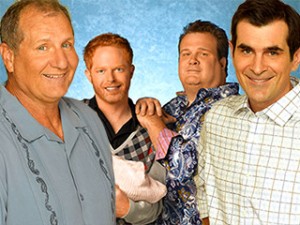 As the name suggests, this consistently funny and touching sit-com gets a lot of mileage out of placing its characters into the very modern world of blended, homosexual and pluralistic families. What keeps the show interesting is its commitment to storytelling and creating layered, surprisingly complex, characters. Every single one is human and flawed, but those flaws are balanced out by their love for each other and their willingness to adapt. The show doesn’t skirt the mishaps and trials of modern life, but it continually embraces the idea that change is not something to fear.
As the name suggests, this consistently funny and touching sit-com gets a lot of mileage out of placing its characters into the very modern world of blended, homosexual and pluralistic families. What keeps the show interesting is its commitment to storytelling and creating layered, surprisingly complex, characters. Every single one is human and flawed, but those flaws are balanced out by their love for each other and their willingness to adapt. The show doesn’t skirt the mishaps and trials of modern life, but it continually embraces the idea that change is not something to fear.
;
;
;
;
Up In The Air
Released in 2009, I think this film captures our current age better than other film except for The Social Network (2010). The film touches on larger themes of mass unemployment, cultural alienation and the way people use technology to create barriers between themselves and others, but ultimately, it’s really an existential character study. Ryan Bingham (George Clooney) is a man who has defined himself by all the baggage he doesn’t carry. As a distant brother and no one’s partner, friend or husband, Bingham finds the limitations of modern, technologically driven life.
;
;

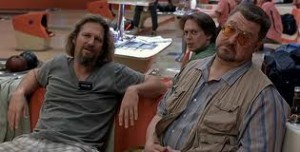
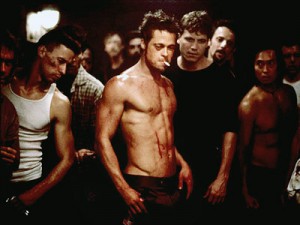

Gasp! I’ve only seen 3 of the shows on this list. I’d better get busy!
Which ones? I always love the idea of making lists and then I get bogged down in what I’m missing. :)
Say Anything, Modern Family, and Up in the Air.
Me too… I need to get on this! I always love Heidi’s lists for giving me great ideas of what to watch and listen to. :)
Maybe Walter in The Visitor (https://dovesandserpents.org/2010/12/the-visitor/) could be on this list as well. He seemed atypical in many ways–and not quite at home in the role of nurturer/caretaker that he was thrust/thrust himself into in the movie.
This is a great list. I appreciate the inclusion of non-ideals. Interesting to me, too, how several of these men, especially Tyler Durden and Lloyd Dobbler have become almost archetypal in my mind.
I am humbled to be reminded that being a human is hard work. The burdens placed on women are sometimes overwhelming, and as a woman, I know them well. But boy oh boy, it ain’t a walk in the park to be a man. I think you captured a really good cross-section here. We’ve got some successes (Phil Dunphy!), but plenty of men fumbling around in the dark. — No, that’s NOT what she said. :)
Even the idealized versions (Pa from “Little House” for example) are more interesting to me when I think about what it took for such men to navigate the questions of modern masculinity. I think Michael Scott of “The Office” and Jack Donaghy of “30 Rock” are two fictional sitcom characters who grapple with what it means to be a leader and how important relationships are in defining success. I also think the show “Parks & Recreation” does a terrific job showcasing different incarnations of the modern masculine specimen, from the sweet doofus Andy to the fast-talking Tom to the stoic libertarian Ron. Oh, and poor schlubby Jerry! And Chris with his fitness/health obsessions.
Good examples, Heidi. I’m a fan of all of the films/television shows you cited. To one degree or another, they offer interesting depictions of modern “manhood.” Each of your examples speak to me because I’m able to see bits and pieces of myself in everyone from Tony Soprano to Don Draper to “the Dude.”
For some reason I’m reminded of an episode in The Sopranos where Tony is feeling his age and the potential loss of his alpha dog status among his friends. At some point in the episode all of the guys are hanging out — gambling, drinking, telling stories — and Tony purposefully picks a fight with the youngest, strongest guy in the room (the pony tail guy) to prove to his peers (but mostly to himself) that he is still “the man” among men. He wins the fight, barely, and then quickly retreats to the privacy of a bathroom where he vomits in the toilet, seemingly on the verge of a heart attack. It’s a primal, National-Geographic-lions-in-the-jungle kind of scene, but it perfectly illustrates one of the many versions of manhood that has existed since Adam first strapped on a fig leaf.
Matt, I was totally thinking of that episode!
What are we to make of another strain of masculinity that has dominated both television and movie screens for the past 10 years or so — I’m thinking of Man caught in a perpetual state of arrested development, the Man who openly eschews most traditional, positive male gender roles in favor of eternal boyhood. Physically these men are usually overweight, unattractive schlubs. And yet they are usually paired with hot wives or girlfriends — strong, long-suffering women who just wish their husbands/boyfriends would finally grow up (aka the “Ugly Guy, Hot Wife” trope):
On television, I’m thinking of such shows as The King of Queens, Everybody Loves Raymond, Still Standing, According to Jim, Curb Your Enthusiasm, Drew Carey Show, etc.
On film, think Judd Apatow movies (Knocked Up, Superbad, Forgetting Sarah Marshall, etc.), any movie starring Adam Sandler (Just Go With It, Click, etc.) or Will Ferrell or Vince Vaughn.
And yet I’d be remiss not to mention one of the best television shows I’ve ever seen about the question of what it means to be a “man,” the great “Men of A Certain Age,” on TNT.
I’ve read that “Men of a Certain Age” is great (or maybe heard it from you?). Hasn’t hopped across the pond yet, I will report back when it does.
Totally don’t get the allure of Will Ferrell or Adam Sandler or Jonah Hill, but love me some Vince Vaughn.
But yes, Matt–every time we see a movie with a pairing like that, I always tell Brent, “There’s no way that guy is getting whoever-the-female-lead is.”
Those same kinds of pairings don’t seem to occur in the other direction–frumpy, overweight, goofy women with hot, sexy male leads. Am I wrong on that?
Wish fulfillment on the part of male comedians/writers? They often have co-writing credit and their names bring in the money. And, since movies/advertising/TV like to throw a hot women into any situation …
Heather, the only films I can think of that reverse that dynamic are the excellent River Phoenix/Lily Taylor movie “Dogfight” and the (frankly awful) Janeane Garafolo movie “The Truth About Cats and Dogs.” Of course, in these films we’re asked to believe that the smart, funny and attractive Janeane Garafolo is ugly because she is not as hot as Uma Thurman and that a slightly overweight Lily Taylor (who plays a passionate, kind and intelligent woman) is ugly. To the credit of “Dogfight,” Taylor seems more awkward than anything and the romance is compelling and believable.
http://en.wikipedia.org/wiki/Dogfight_(film)
For me, the most egregious counterexample to the hot wife/funny slob pairing is putting Gwyneth Paltrow in a fat suit and pairing her with Jack Black.
We just watched the first two episodes of ‘Modern Family’, and I really like it. I love how they pick the big political ‘hot potato’ family types – with a Hispanic immigrant wife, gay couple (not especially good looking)… and dealing with fatherhood explicitly on the second episode: very cool. Plus, funny. Which I don’t always think comedy is, for the record.
Maybe The Captain should take a variation of Willie Nelson’s advice (after all, he usedta like the Mustang Grill…see your other blog)…
Or maybe his ladyfriends should start up their OWN blog…you know…something with a snappy title, like “Confessions of a Shagged (Jeet) Fan” or something shorter/cleverer, and share any embarrassing moments. After they sell their balls, of course. Either it’s a bunch o’jive, or the blowblack has just begun…?